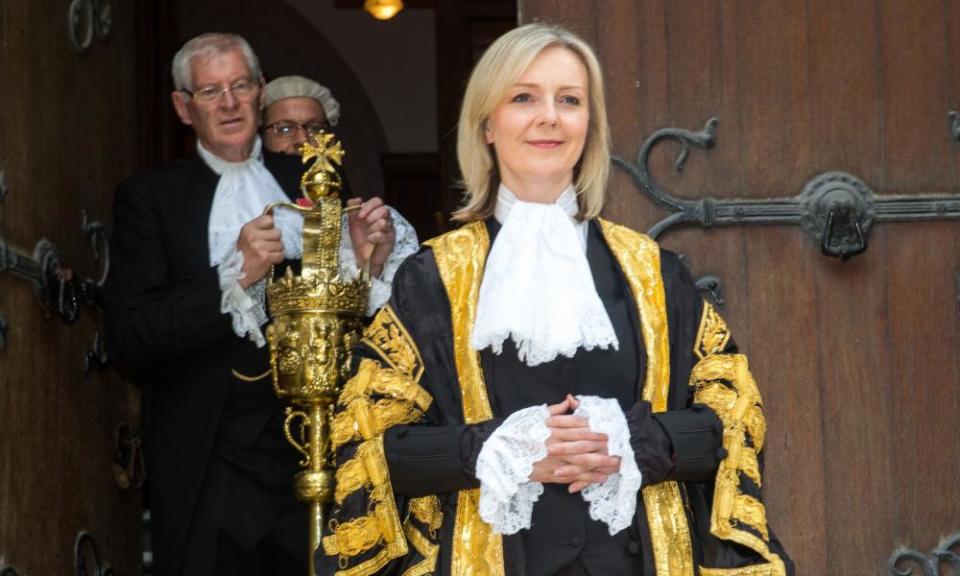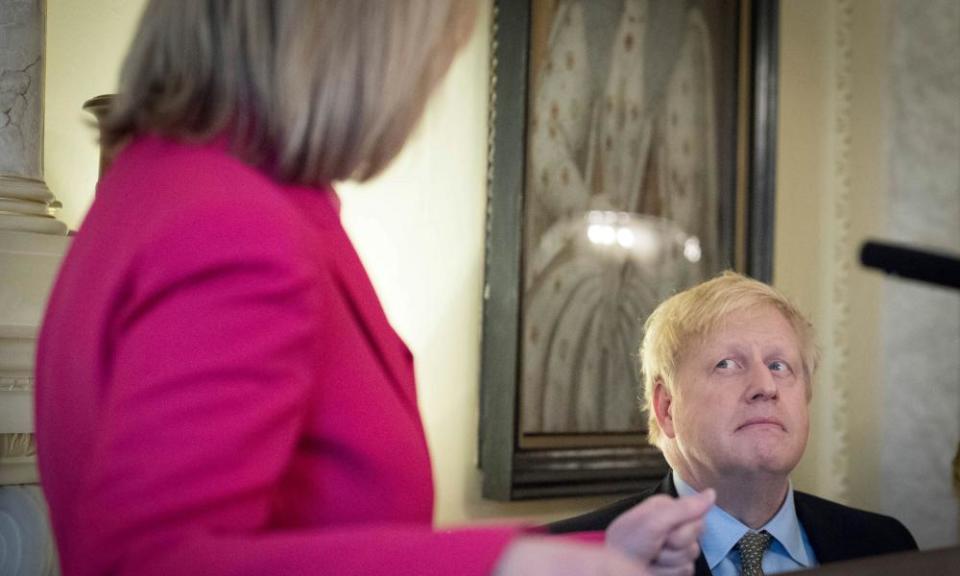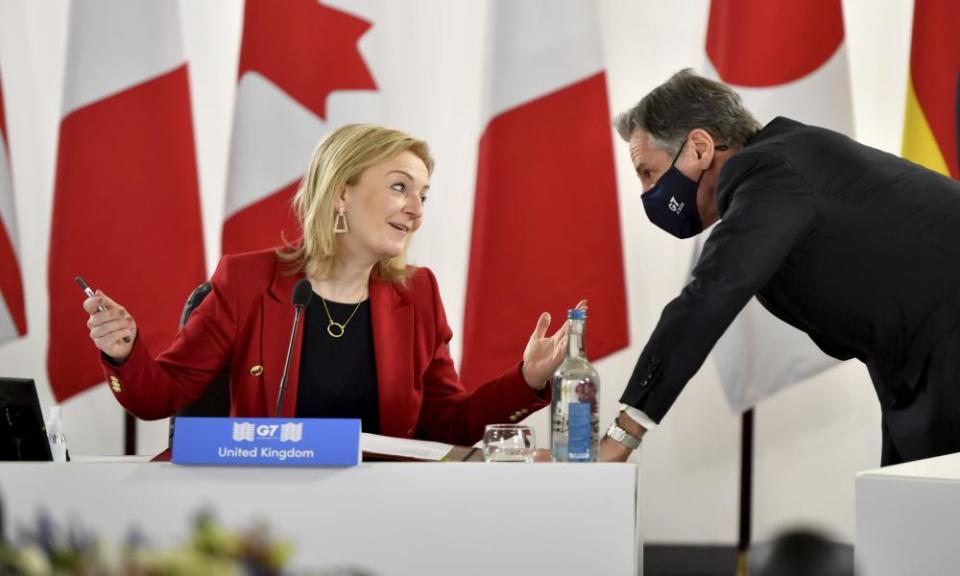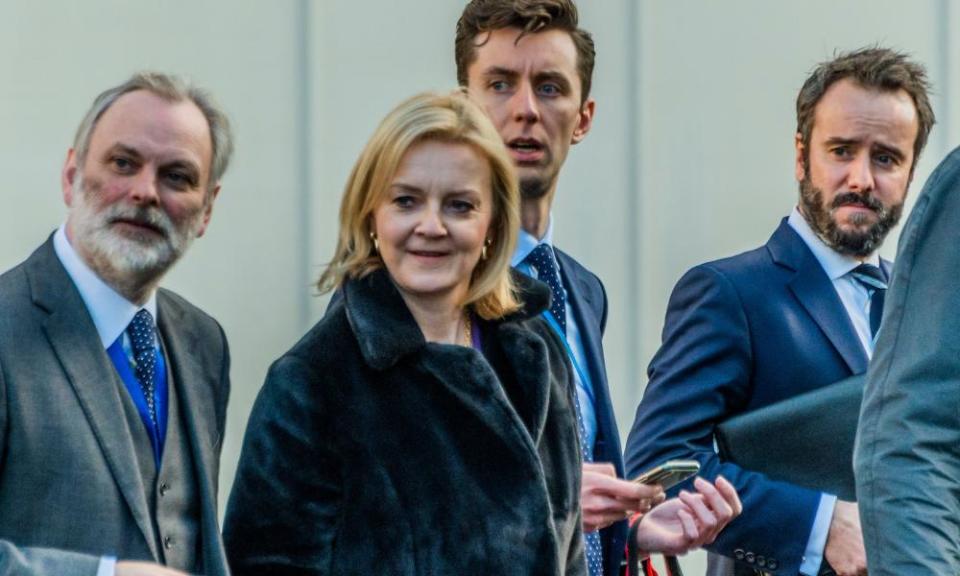Liz Truss: the ‘human hand grenade’ Tories have taken to their hearts

In her early years in Whitehall, Liz Truss was known to civil servants as the “human hand grenade”, a nickname for her that Boris Johnson has since adopted. Like many of the memes around Truss, it is one she has embraced with gusto.
Those close to the prime minister say it was not always intended as an accolade. “She does tend to blow things up. He used to say anything passed her way needed to be handled with care,” one staffer recalled.
But with Johnson on the verge of blowing up his own premiership, it may be the human hand grenade waiting to pick up the pieces. The foreign secretary, who was an early Johnson loyalist, is the other name mentioned in the same breath as Rishi Sunak in the fight to be Johnson’s successor.
Truss, 46, is often described as the party members’ darling, for many months topping ConservativeHome’s poll of members asked for their favourite minister. “The role Liz has always said she wanted is chancellor. I think that could still be where her heart lies, but when she kept topping those polls, it turned her head,” one former aide said.
But when it comes to a leadership challenge – rather than their pet favourite – the mood of members seems to change and Truss is suddenly the underdog. In an Opinium poll of Conservative members, Sunak beats his closest rival by 28 points. The stats get even worse when you go to the country: Truss is the 23rd most famous Tory politician, according to YouGov, with Sunak and other potential rivals such as Jeremy Hunt, Michael Gove and Sajid Javid all in the top 10.

Those close to Truss say none of this will daunt her. “People have underestimated her for her entire political career,” a former aide said.
In many ways her strategy has been similar to Johnson’s, who courted sceptical MPs over many months with dinners hosted by Jacob Rees-Mogg. Truss has been hosting social events for MPs that have become known as “fizz with Liz”, though her allies swear she doesn’t use the term herself.
Scottish Tories including Douglas Ross, who called for the PM to resign, had drinks with Truss last week. Another group met the foreign secretary on Monday night before she flew to Australia for a tour. Each Monday she holds surgeries in the Commons tea room for MPs to bring their concerns.
“She pressed the button on leadership stuff around three months ago,” one MP said. “But the problem is that everyone knows about it now. She went too early.”
Sources close to Truss deny her contact with MPs amounts to electioneering. “She has always hosted these meetings, since she was trade secretary, because she values what MPs think. She is more in touch than many.”
Many MPs feel she will need a major turn in fortunes to win enough support to make it on to the ballot paper. There are already rumours of a deal between other candidates to keep her out.
“I would be very surprised if she would get through,” one minister said. Another colleague added: “MPs base their decision on whether the person will keep them their seat and whether they actually like the candidate. You need at least one of those two. I’m not sure she fits either of those categories for many people.”
“The party will not choose Liz,” a Tory adviser said. “She is flag-waving, sure, but she doesn’t have the charisma of Boris. She appeals to the TaxPayers’ Alliance and IEA wing of the party but she has no crossover appeal,” they added in reference to the Institute of Economic Affairs free-market thinktank.
Yet many colleagues also dismissed Johnson’s chances of making the ballot paper, such was his unpopularity among them.
Like Margaret Thatcher, Truss has an intriguing backstory, unlike Sunak’s Winchester, Oxford, hedge fund trajectory. She grew up in Leeds with leftwing parents, attended a high-achieving comprehensive, and her mother took her on peace marches.
At Oxford she chaired the Lib Dems but began to develop a new philosophy – of the need for individuals to keep their own money to ensure personal freedom. That drew her to the Conservatives, she has said.
Selected for the plum South West Norfolk seat in 2010, her career in politics almost came to an abrupt end after members found out – and objected to – her affair with the MP Mark Field.
“It’s quite a credit that she’s managed to turn that reputation around and become the membership’s darling, but that’s because she gets what’s important to them: pride, optimism, a belief in the power of the individual,” the staffer said.
Under David Cameron, her first cabinet post was as environment secretary, leading to her infamous viral speech at the Conservative conference in 2014 – a rage against cheese imports in which she exclaimed: “That is a disgrace!”
“I think that did change something for Liz, it actually meant she was one of the first politicians of this generation to spot the potential of social media,” the former adviser said.
When she arrived as international trade secretary, staff handed her social media strategies for Twitter and LinkedIn but she told them: “Instagram’s my thing.” She taught aides to use Boomerang, a setting on Instagram to create short clips.
In recent years, images of her – in red and blue pantsuits, hair tightly curled, boarding jets, strolling purposefully past famous buildings or driving a tank in Estonia – have been carefully curated. Even a picture of her daughter’s birthday cake carries the caption “You can’t stop progress”. The posts are littered with hashtags such as #freeworld #selfdetermination and #nolimits.
Truss’s other moment of political crisis – after her battle in her constituency and awkward cheese speech – followed her appointment by Theresa May as justice secretary during the legal row over the triggering of article 50 and the Daily Mail’s infamous front page declaring three high court judges “enemies of the people”.

The story broke when Truss was dining in one of London’s inns of court, surrounded by senior members of the judiciary. “She will not have been lacking in advice. But the statement she came out with was mealy mouthed. And she couldn’t recover from it,” one senior legal figure said.
“Theresa came to realise that it was not a wise appointment,” one former cabinet minister said. “She forfeited the confidence of the judiciary.”
Within 11 months, Truss had been reshuffled to become chief secretary of the Treasury, ostensibly a demotion, but one which allowed her to set out her stall as a free-market thinker in a number of high-profile speeches.
One ally said: “People often say about Liz: ‘I’m not sure what she stands for.’ And that could not be further from the truth; she has set out exactly what she stands for.”

“Britain is a nation of Uber-riding, Deliveroo-eating, Airbnb-ing freedom fighters,” she said in one speech, a retort to critics of the gig economy. “And to turbocharge our future we need to champion these values, and let people off the leash by liberating every corner of the economy.”
She took swipes at environmental regulation, the banning of plastic straws and cups, with digs at enjoying “the warm glow of wood-burning Goves” when her colleague Michael Gove was at the environment department.
In the Treasury she often told colleagues the answer to their problems was not more public spending but freedom for the market. “I aim to be the disrupter in chief; I want to challenge those who aim to block change, stop development and restrict success.”
Yet when serious challenge has been made to her low-tax beliefs, Truss has been pragmatic, speaking out in private against Sunak’s national insurance rise in late summer last year but then, once it was policy, declining to join Jacob Rees-Mogg in January urging Sunak to cancel the rise.
If the choice does come down to Truss or Sunak, one contrast will be Truss’s closeness and loyalty to Johnson. Asked at Conservative party conference last year to name her favourite foreign secretary from history, Truss did not miss a beat. “Boris Johnson.”
On Thursday evening last week, after a brutal day for the prime minister, Truss defended him in the media, saying Tories should support him “100%”.
In 2019 she was his first cabinet backer. Before that, Johnson was struggling to attract names for his leadership campaign. Those who had publicly backed him were low-grade backbenchers, some with dubious reputations.
He was becoming agitated with his team, and seeking higher-profile support. Truss broke cover to declare her allegiance, going on BBC Radio 4 to defend Johnson on a litany of awkward topics, from extramarital affairs to the imprisonment of Nazanin Zaghari-Ratcliffe.
“She was canny, she decided Johnson could win, unlike Priti [Patel] who ummed and ahhed about it for ages,” one senior member of the team recalled.

Though campaigners are hesitant to class her as part of the inner team, she attended a number of the preparations for government meetings, off-grid with key advisers such as Lord Frost, to discuss priorities. “Some of it was to keep her busy,” the staffer recalled.
During the 2019 election, Truss pitched to Johnson that a US trade deal should be one of the key pledges of the campaign. The senior team in Downing Street were gobsmacked, believing it would give Jeremy Corbyn an open goal to talk about selling off the NHS to the US.
“How about we do not talk about this at all?” one said. Another said: “She wanted to show what great things could be achieved post-Brexit – it’s typical Liz optimism – but the problem is we weren’t going to get one.”
Many of those close to Johnson now admit Truss was a success as international trade secretary despite some initial reservations. Under her, the UK signed a deal with Japan and rolled over a number of strategically important deals – with Canada, Israel, Singapore and others.
“She has been much better in the roles that suited her – in the Treasury, at trade and she may well be better at [the Foreign Office]. It plays to her strengths,” the former cabinet minister said.
Others more dismissively consider her as just a valuable frontwoman. “She was good at getting out there, talking about great British produce, and the actual work is done by officials,” a senior No 10 official said. “It’s like putting someone in for a driving test in a self-driving car.”
One Whitehall source said that was unfair. “She is an economist and in the negotiations she had serious grip of the detail. She knew what tweaks she wanted to make. And she often got her own way.”
If Johnson wanted to keep his rival busy, he has succeeded. Truss’s brief is enormous: foreign secretary, Brexit negotiations, international development and equalities minister. Truss may now be in the job which comes with maximum peril for her leadership chances, but any success is likely to significantly bolster her standing.
“Ireland is going to kill her,” a former Foreign Office official predicted. “She wants to prove her Brexiter credentials but there is no way to win with this strategy. That threat in the Sunday Telegraph [on triggering article 16] was not the correct approach.
“Now, if she caves in, the right will abandon her, and that’s the very constituency she needs for the leadership.”

Though many MPs consider true Brexit believer status to be less important, Truss backed remain in the 2016 referendum, speaking about not wanting her own daughters to “need a visa or permit to work in Europe, or where they are hampered from growing a business because of extortionate call costs and barriers to trade”.
“She has done incredibly well at erasing her remainer past,” a senior Conservative said. “But I think when we get to a leadership contest, she will have a huge challenge going against Rishi Sunak, Michael Gove, Nadhim Zahawi.
“Not particularly because they were true Brexiters but more because the question will be: are you true to yourself? Rishi, Michael and Boris too, they all took personal hits for their beliefs. She will never do that.”

 Yahoo Movies
Yahoo Movies 
